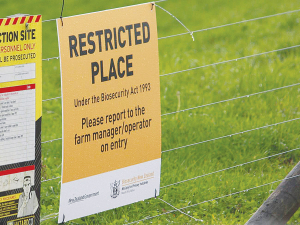We must keep our foot on the pedal
OPINION: Last week marked a major step forward in our work to eradicate Mycoplasma bovis.
 The announcement of zero known cases came near the end of the season, but now with the milk flowing it’s not surprising that the bulk tank milk screening process has detected a case of M. bovis in Canterbury.
The announcement of zero known cases came near the end of the season, but now with the milk flowing it’s not surprising that the bulk tank milk screening process has detected a case of M. bovis in Canterbury.
OPINION: News of the discovery of a new case of Mycoplasma bovis on a dairy farm in Canterbury should not come as a surprise.
After all, in April when Agriculture Minister Damien O’Connor announced that there were no more active cases in the country, he chose his words carefully with the caveat that more cases may come to light.
The announcement of zero known cases came near the end of the season, but now with the milk flowing it’s not surprising that the bulk tank milk screening process has detected a case of M. bovis in Canterbury. One’s heart must go out to the farmer and family who will be shocked at the news. They now face the terrible consequences of having their herd culled and going through the process of establishing a new herd. That’s tough and in effect they are ‘taking one for the team’.
But what this also highlights is that NZ can ill afford to be lax when it comes to biosecurity. The excellent work of Ministry for Primary Industries (MPI) with its testing programme and the ongoing support for this by DairyNZ and B+LNZ is to be commended.
It is a well-known fact that the thing that worries agricultural ministers the most is biosecurity. Keeping diseases out of the country and taking drastic measures to eradicate them if perchance they slip through our border is pivotal to the NZ economy.
We hear lots of crazy political rhetoric as the election looms – including cutting the staff in the public service. While some of this may be justified, we should hope that no one will be stupid enough to cut public services which are the foundation and protectors of our economy. It is not only the border; it’s at farm level where property owners need to obey the rules that ultimately protect their businesses.
The work done by MPI and other agencies to protect our primary exports must not be compromised to satisfy some political cost cutting fantasy.
Thankfully NZ has managed to avoid any biosecurity catastrophes and this latest outbreak of M. bovis is a warning to everyone to be vigilant in this regard.
Former Fonterra executive Alex Turnbull has been appointed CEO to lead all five Yili Oceania Business Division companies in New Zealand.
Fonterra executive René Dedoncker is leaving the co-operative later this year to lead Australian agribusiness Elders.
Alliance Group and the Southland Stags rugby team have joined forces in a partnership that will see the the meat co-operative's farmgate brand feature on players' team kits and replica jerseys.
Fonterra's plan to expand its organic programme to the South Island is being well received by farmers, the co-op says.
Voting has started for the renewal of DairyNZ's milksolids levy.
The most successful catchment groups in NZ are those that have 'a source to sea' approach.
OPINION: A dairy version of fantasy football has been launched.
OPINION: In recent weeks beaches in Auckland, Wellington and Christchurch have been unsafe to swim in because of recent heavy…